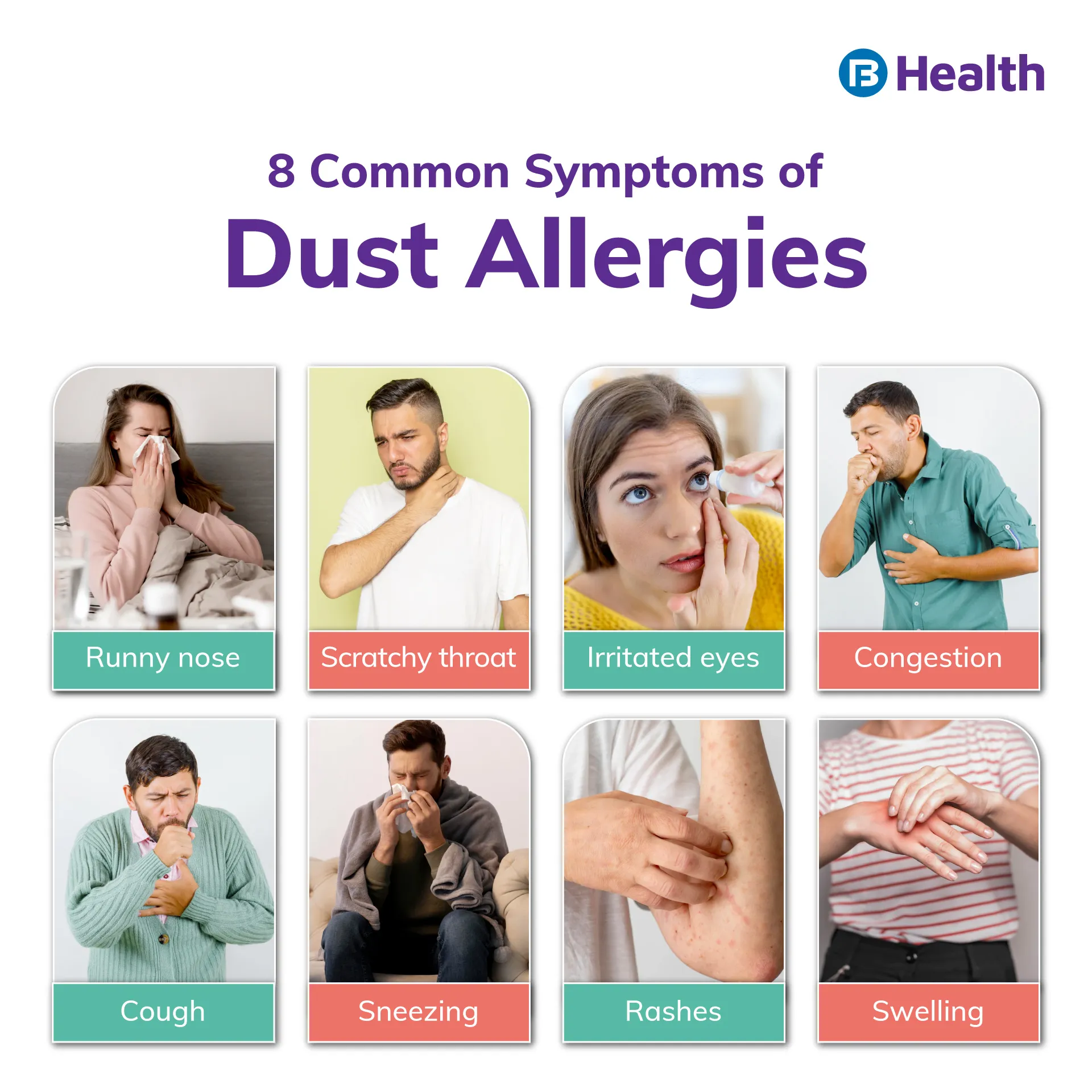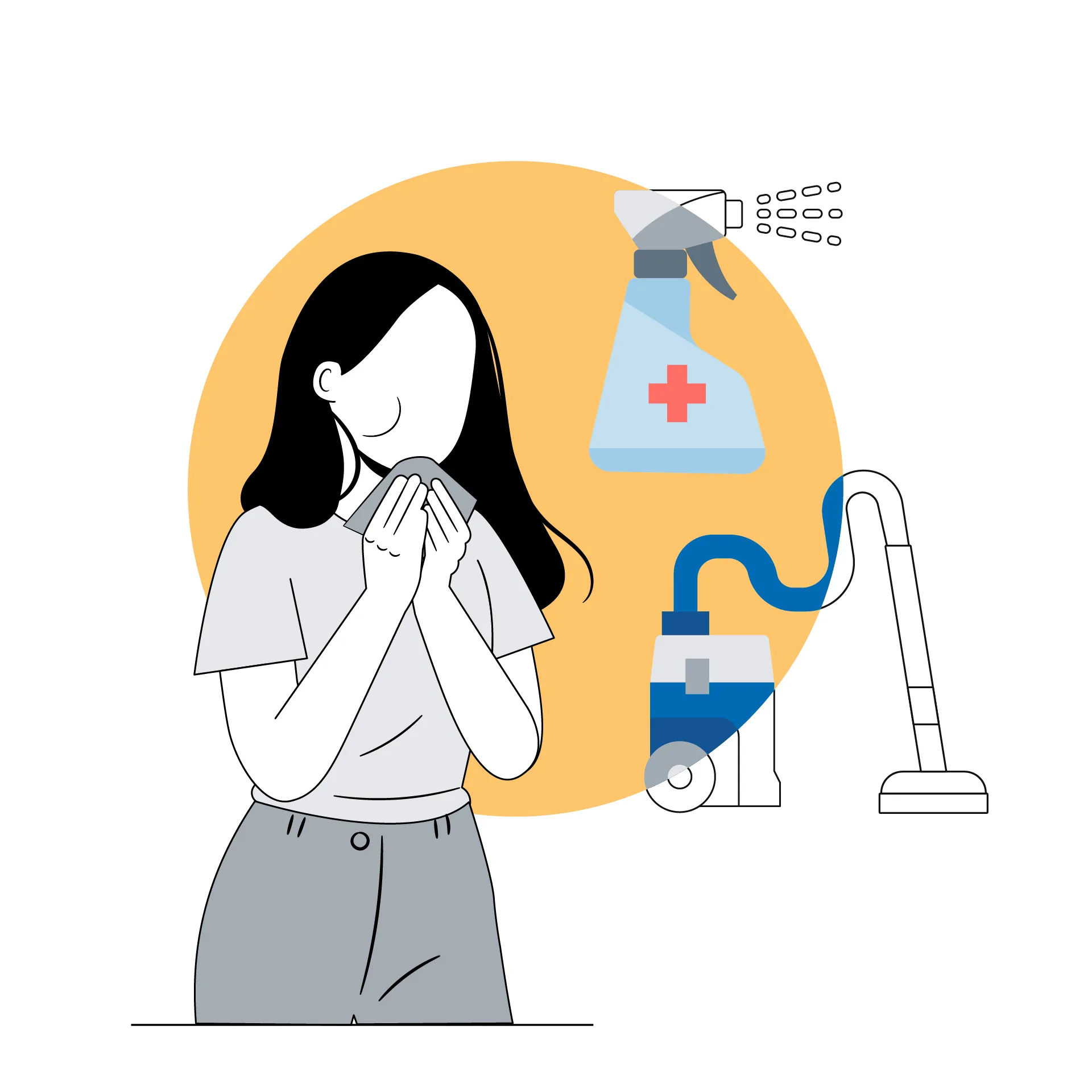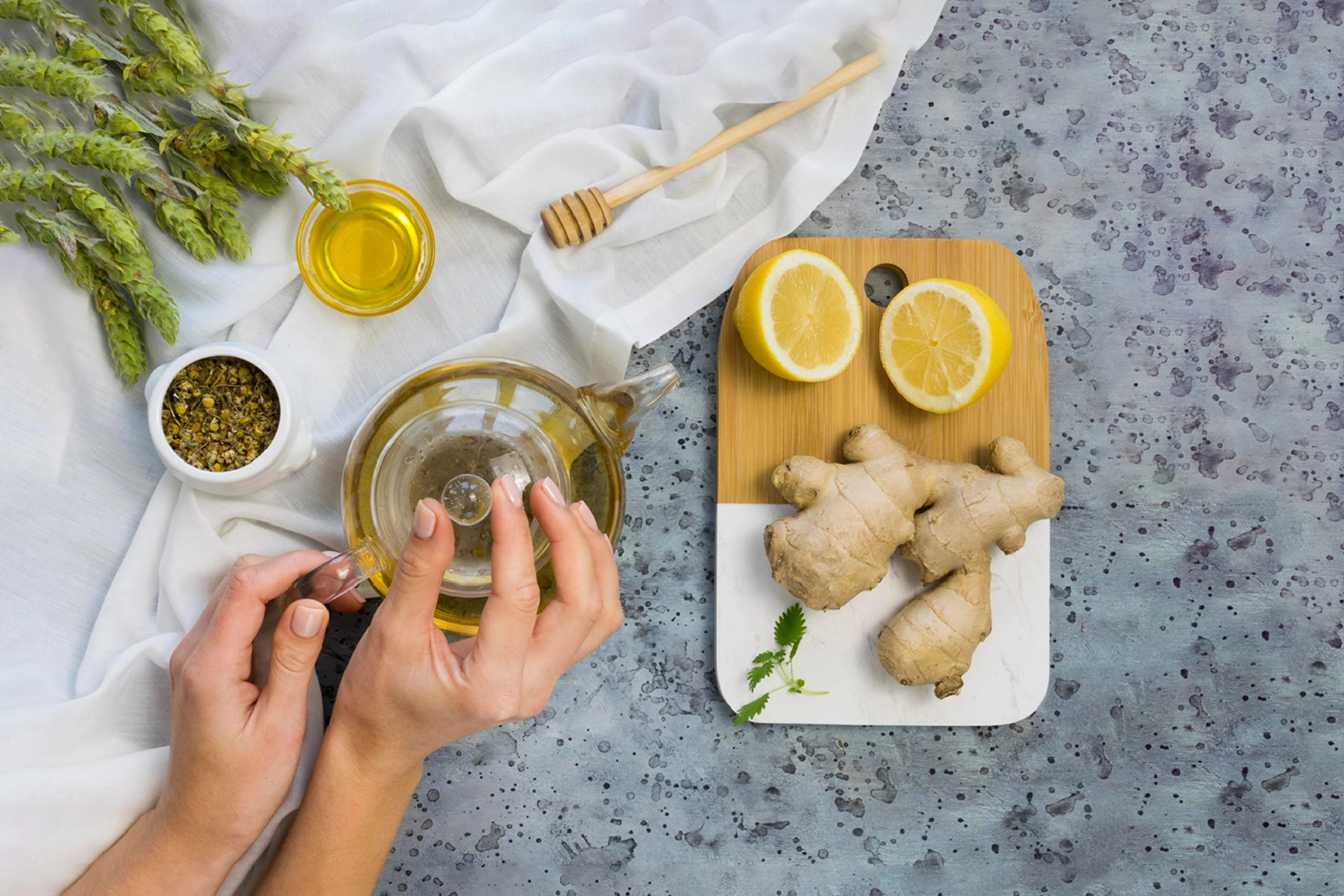Ayurveda | 7 min read
Dust Allergies: Causes, Symptoms and Easy Home Remedies
Medically reviewed by
Table of Content
Key Takeaways
- Allergens like dust mites, pollen, mold are common causes of dust allergies
- Medicine & limited exposure to allergens help in treatment for dust allergies
- Dust allergy home remedies include tulsi, peppermint, steam, and essential oil
Dust allergies happen when you come in contact with an allergen, also known as a trigger. This can happen by either swallowing, inhaling, on touching an allergen. Common allergic reactions caused include; seasonal changes, dust, pollen, insects, or even animals. There are different types of allergic reactions that have a different effects on individuals. That You Can Try
Dust allergies are one of the most common forms of allergy and affect almost 10% of the population [1]. Common allergens present in the dust can trigger dust allergies and some of the area
- Dust mites
- Pet dander and hair
- Mold or pollen
- Cockroach dropping or body parts.
Coming in contact with these can lead to an allergic reaction.
A common treatment for dust allergy is OTC medicines that help relieve your symptoms. Limiting your exposure to allergens is also an effective remedy for dust allergies. Other than this, there are some dust allergy home remedies that can help ease your symptoms. Read on to know about the 7 effective dust allergy remedies you can try.
What Causes Dust Allergy?
Dust mites are the key reason for dust allergy. Several other reasons are listed below:
Pollen
It is a powdery substance made up of pollen grains. It occurs naturally in plants, flowers, and grasses. Different pollens may cause allergic reactions in people
Cockroaches
When inhaled, cockroach excrement can cause dust allergies in some people. These microscopic particles often mix with dust from homes to cause allergies
Mould
Mould is a fungus that produces spores that can float in the air. These spores can also cause dust allergies
Yeast
Yeast is a cousin of mold, and antibiotic overuse can cause an overgrowth of yeast called Candida allicins in your intestines. Yeast can congest the passageways in your nose and sinuses, resulting in irritation and increasing your susceptibility to dust allergies
Animal Hair, Fur, and Feathers
Another source of dust allergy is pets. Their dander, feces, or saliva are potential allergens, especially when mixed with dust

Symptoms of Dust Allergy
Dust allergy symptoms include:
- A runny nose
- Sneezing and sniffling
- Itchy and red eyes
- Itching
- Coughing and wheezing
- Shortness of breath
- Chest tightness
While it is tough to eliminate dust mites, you can try some simple home remedies to combat the allergens. The following are some home remedies for dust allergies.
12 Effective home remedies of Dust Allergy
Apple Cider Vinegar
Apple cider vinegar's anti-inflammatory and expectorant properties can aid in treating dust allergies and the associated cold-like symptoms. ACV also has antimicrobial properties that can help prevent allergy flare-ups. It is a natural alternative to anti-allergy medicines in treating dust allergies.
Turmeric
This spice is one of the most effective natural remedies for dust allergies. Turmeric contains curcumin, an active constituent that acts as a natural decongestant. It also functions as a natural anti-allergy, reducing the release of histamines in the body, which can cause allergies. Turmeric also has anti-inflammatory and antibacterial properties, which can help prevent your allergy from becoming an infection.
Aloe Vera
Aloe vera has anti-inflammatory and analgesic properties by nature. It can aid in treating swelling and pain caused by dust allergies.
Nettle leaf Tea
The stinging nettle plant produces nettle leaves. This plant contains natural anti-histamine properties that inhibit the release of allergy-causing histamines in the body. As a result, the symptoms of dust allergy get reduced. This plant's anti-inflammatory properties aid in reducing the inflammation and swelling of the airways caused by allergies. For decades, it has been a go-to solution for dust allergies.
House Plants
Consider keeping a few allergy-friendly plants in your home. Plants such as dracaena are very effective at trapping allergens in their leaves. Plants like lady palm and bamboo help keep insects away while acting as filters and air purifiers.
Peppermint Tea
Peppermint has anti-inflammatory properties and can help in decongestion. It also contains menthol, a natural treatment of wheezing and sneezing. These properties make peppermint an effective ayurvedic treatment for dust allergy.
You can drink peppermint tea or beverage daily to relieve the symptoms of dust allergies. You can also add a teaspoon of dried peppermint leaves to a cup of hot water along with honey.
Honey
Honey is one of the best ayurvedic treatment for allergy from dust because it has pollen. Pollen is a common allergen found in dust. Being exposed to pollen on a regular basis may help your body become familiar with it. This leads to your body being less sensitive towards it. Try consuming it twice in a day to empower your body against common dust allergens like pollen.
Essential oil
Eucalyptus is an essential oil that works like an expectorant. It also has analgesic and anti-inflammatory properties. These help open up the lungs and sinus resulting in improved circulation. Eucalyptus oil also reduces allergy symptoms. As a result of this, it is one of the common home remedies for dust allergy cough.
Add a few drops of eucalyptus oil to coconut oil or any other carrier oil and rub it on your throat and chest. You can also try diluting it in water and inhale its steam to help manage dust allergies symptoms.
Vitamin C
Histamines are your immune system’s way of protecting your body from a foreign substance. When released, histamines affect your eyes, throat, or lungs and cause allergy symptoms. Vitamin C helps inhibit the release of histamines. This results in it being one of the few home remedies for dust allergy in eyes.
You can try and include vitamin C in your daily diet in the form of fruits or vegetables. A high dose of vitamin C helps in reduce allergy related symptoms [2].
Ghee
Ghee has healing and medicinal benefits which makes it good for your health. The anti-inflammatory properties of ghee can help control sneezing and clear nasal passage.
You can consume 1/4th spoon of ghee for immediate relief from symptoms of dust allergies. You can also try putting a few drops of ghee in your nostrils. Daily practice of this will help form a protective layer against common allergens.
Steam
Steam is also an effective remedy for dust allergies. It works by loosening the mucus present in your nasal passage, lungs, or throat. This helps in relieving sore throat caused by dust allergies. This is why, steam inhalation is one of the effective home remedies for dust allergy in throat.
Steam is also one of the common ayurvedic skincare home remedies. The steam open ups your pores and helps get rid of dirt and other impurities, giving you a clearer skin.

Tulsi
The health benefits of tulsi are abundant. They include pacifying pitta dosha symptoms and allergy symptoms. It supports your respiratory system as well as your immune system. Tulsi has anti-microbial properties and helps remove phlegm from your throat. It also has components that help in relieving congestion. Try drinking tulsi tea daily to help fight dust allergies symptoms.
Additional Read: Basil Leaves BenefitsCautions to Take if You Have Dust Allergies
To reduce your exposure to indoor dust, use the tips listed below.
- Remove all wall-to-wall carpeting, particularly in your bedroom
- Keep your pets out of the bedroom and, if possible, out of the house
- Maintain a humidity-free environment indoors
- Cover your beds and pillows with mite-proof linens
- Use a high-efficiency filter in your air conditioning unit, and if you have cockroaches, schedule regular pest control visits
- Maintain a clean and dust-free environment in your home. For this purpose, you can use a central vacuum or a vacuum with a HEPA filter
- Avoid direct exposure to fog and cold weather (particularly in the morning). If you must go outside, you should cover your head
- Avoid cold beverages, ice cream, fried foods, and reheated foods
- Consume seasonal and locally grown fruits and vegetables
Apart from these allergic ayurvedic treatments, you can take some precautionary measures too. Some common precautionary measures for dust allergies are
- Keep the environment free of dust
- Have regular pest control
- Make sure there’s no humidity
- Use linens and pillows that are mite free
If your symptoms are persistent or get severe, contact a doctor immediately. Book an in-clinic or online doctor consultation on Bajaj Finserv Health. Consulting a doctor will help you know how to cure dust allergy and what precautions you need to take. These proactive measures will help you stay healthy and safe.
References
- https://www.thermofisher.com/allergy/us/en/allergen-fact-sheets.html?allergen=dust-mite
- https://www.ncbi.nlm.nih.gov/pmc/articles/PMC6136002/
Disclaimer
Please note that this article is solely meant for informational purposes and Bajaj Finserv Health Limited (“BFHL”) does not shoulder any responsibility of the views/advice/information expressed/given by the writer/reviewer/originator. This article should not be considered as a substitute for any medical advice, diagnosis or treatment. Always consult with your trusted physician/qualified healthcare professional to evaluate your medical condition. The above article has been reviewed by a qualified doctor and BFHL is not responsible for any damages for any information or services provided by any third party.





